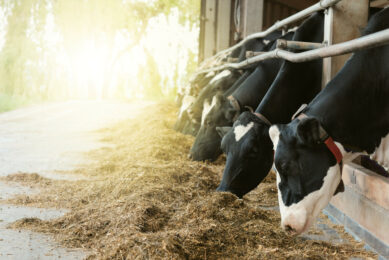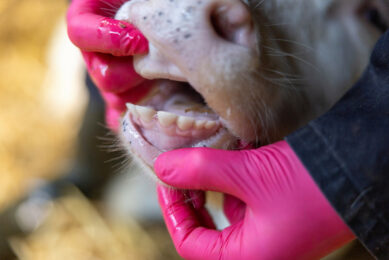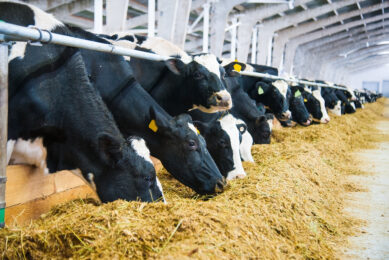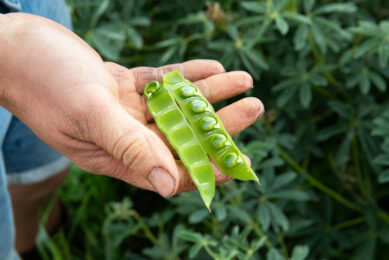Bee propolis improves calf health
Can bees offer more than just honey? Their craftwork ‘propolis’ has emerged to be a feed additive of value to the health of calves.
Diarrhoea is the main condition affecting calves during the first weeks of life, when colostrum immunity is not adequate to fight pathogens. What is seen in intensive systems is that calves are replaced continuously and frequently, creating a production pattern that leads to high risk of infection and incidences of diarrhoea. In this practice, antibiotics have always been important in reducing the morbidity and mortality due to diseases and conditions such as diarrhoea, septicaemia, and respiratory diseases. However, it is now well known that the feed industry is in efforts to reduce the use of antibiotics as feed growth promoters, by inclusion of safe and sustainable additives. In addition, due to the high occurrence of gastrointestinal disorders and their negative effects on calf morbidity and mortality and growth performance, dairy systems are always looking to increase the inclusion of additives that have a positive effect on the control of diarrhoea.

Previous research has shown that propolis possesses special properties that include antimicrobial, anti-inflammatory, antioxidant, antiviral, anti-fungal, and immunomodulatory properties; that qualifies propolis as a potential natural additive to improve animal health and performance.
Researchers at the University of São Paulo have recently conducted a research (published in the Journal of Dairy Science) to evaluate possible beneficial effects of red propolis extract supplementation on the health status and growth performance of dairy calves during the preweaning phase; their findings are discussed here.
What is propolis?
Propolis is a natural product produced by honey bees (Apis mellifera) and sold commercially. It is also commonly known as bee glue. Interestingly, in a bee colony, the entrance to the hive is lined with propolis. Bees use propolis for disinfection of the honeycomb or mummification of larger intruders. This way, the bee colony is protected against infection and threats posed primarily by microorganisms. Propolis is a complex mixture, formed by resinous and balsamic material, with a complex and variable composition related to the flora of each region visited by the bees and the period of resin collection.
 Calf housing: Necessary improvements to boost productivity
Calf housing: Necessary improvements to boost productivity
Research in the US and Canada reveals new ways to look at housing with the aim to bolster calf development and improve long-term productivity.
As mentioned earlier, it is well known for its antimicrobial, antioxidant, anti-fungal and anti-inflammatory effects, and the ability to improve immune system functions in humans and animals. Propolis may represent a potential natural additive to control diseases and act preventively in animals, promoting their immunity. Previous studies indicate that the antibacterial activity of propolis controls the agent of the disease without developing resistance. Due to its several pharmacological properties, propolis has been used worldwide in folk medicine. As shown in literature studies, the active substances of propolis includes salicylic acid, benzoic acid, cinnamic acid esters, phenolic compounds, flavonoids, triterpene alcohols, lipid compounds, and enzymes. The presence of phenols and flavonoids is the reason for its antioxidant potency.
The study
In their study, 32 new-born calves were individually housed, with free access to water and concentrate, and fed 6 L/day of whole milk. Animals were blocked according to their date of birth, weight, and sex and distributed randomly into 2 treatments: (1) control and (2) supplementation with 4 mL/d of red propolis extract (30%) in whole milk, starting on the third day of age. Feed consumption, faecal and health scores were monitored daily from 1 day of age to 56 days.
Diarrhoea and disease occurrence
Calves that were supplemented with the propolis extract had lower faecal scores (less diarrhoea), fewer days of diarrhoea and fever, and fewer veterinary treatments on diarrhoea (0.9 days per calf vs 0.2 days per calf, respectively). Low incidence of diarrhoea was attributed to the extract’s potent antimicrobial activity. They related their results to previous studies that had shown effectiveness of propolis in controlling infections caused by Escherichia coli, Salmonella Enteritidis and Salmonella Typhimurium. In the current study, calves not supplemented with propolis were treated more often with antibiotics for diarrhoea than calves supplemented with propolis. In their literature study they also, interestingly, found that even a 2 mL/day tincture of propolis extract prevented diarrhoea in calves (Yucel et al., 2015).
Antioxidant status
Iron concentration has a great effect on oxidative status, playing an important role in protecting the body against oxidative stress. It was expected that animals supplemented with propolis extract would present greater rates of iron-binding capacity due to high antioxidant capacity of propolis. However, the increase on iron-binding capacity effected by propolis was minimal (about 0.3% higher than the control diet).
Immunity
The supplementation with propolis extract did not affect both white blood cells and red blood cells. However, the results found in this study were within the values considered appropriate for healthy calves. The authors expected increases in theses blood parameters since they had found, in their literature study, an increase in the number of red blood cells during the second week of life in calves receiving 4 ml/day of 10% propolis extract (Kupczyński et al., 2012). The authors also observed that the highest concentrations of iron occurred in animals supplemented with 4 ml/d of propolis, concomitant with the trend in increasing red cell count in the same period and the same propolis diet.
Although our results are most compatible with no important effect on the total leukocyte count, propolis supplementation was beneficial in preventing diarrhoea in calves, suggesting the need for more studies to understand the complex immunomodulation activity of propolis,” said the researchers.
Growth performance
Although the difference was not big, they found a higher weight gain (6%) in the propolis-supplemented calves compared to the unsupplemented, corresponding to a 4% increase in plasma glucose observed in the propolis diet. They attributed the lower growth of the control diet to the high incidence of diarrhoea. “The loss of fluid that occurs during the occurrence of diarrhoea is a result of increased permeability and intestinal motility, which will reduce the absorption of nutrients, fluids, and electrolytes,” they said. On the other hand, they suggested that propolis could contribute to better growth performance as an indirect effect of balancing microbiota with a consequent lower prevalence of pathogens and greater nutrient utilisation.
Milk intake was not affected by propolis supplementation and remained constant throughout the study. Their line of thought (towards future research focus) was that it could be that propolis supplementation through a solid diet has a different effect on feed intake than liquid dietary supplementation, considering the ease with which milk is taken.
 China: How education ensures dairy development
China: How education ensures dairy development
Quality education is a vital part of the dairy sector’s development in China.
More research suggested
In conclusion, although the positive effects on performance and selected blood parameters were less significant as expected, the results indicate that red propolis supplementation has potential in improving calf health and reducing the incidence of diarrhoea, thereby lowering veterinary costs, and potentially reducing the use of antibiotics in calf rearing systems. Besides the positive effect of propolis on diarrhoea, the researchers suggested the need for more studies to understand the complex immunomodulation activity of propolis. Of interest as well, is the effect on feed intake when the extract is supplied through the diet – the extract was said to have a bitter flavour.
Join 13,000+ subscribers
Subscribe to our newsletter to stay updated about all the need-to-know content in the dairy sector, two times a week.










